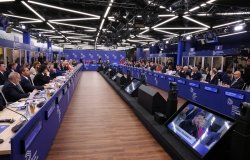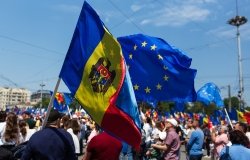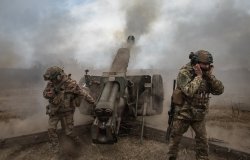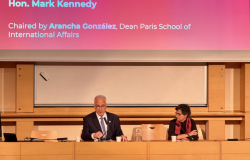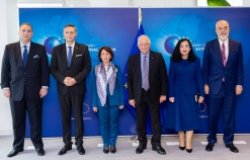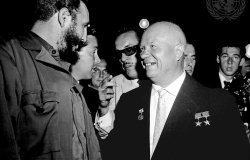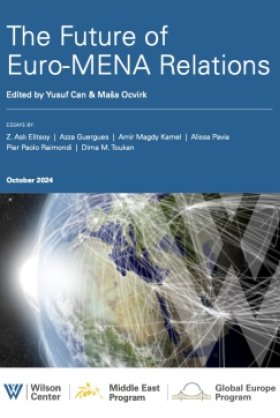205. Montenegro: Prospects for the Yugoslav Federation
In the early nineties, during the breakup of the Socialist Federal Republic of Yugoslavia, the international community supported the independence of all of its six constituent republics. Four republics - Slovenia, Croatia, Bosnia-Herzegovina and Macedonia - became independent states. The remaining two other republics, Serbia and Montenegro, created the Federal Republic of Yugoslavia in April 1992. One month later the new state, driven by international sanctions, fell prey to isolation. In a referendum, held in March 1992, a majority of the citizens of Montenegro voted for co-existence with Serbia in a new common Federal state.
The option of a referendum was not extended to the citizens of Serbia. Instead, the Serbian authorities decided to create a new federal state with Montenegro. The different positions of the citizens of Serbia and Montenegro in creating a new federal state marked the beginning of future misunderstandings, differences and confrontations between the two Yugoslav republics.
Today, the Yugoslav federation is in the midst of a deep internal crisis. Relations between Montenegro and Serbia are at the lowest level ever in the history of the two nations. What are the roots and causes of this crisis? Is it possible to heal the current rift within the Yugoslav federation? What kind of remedies could be recommended and what prospects could be expected? These are questions that have not been clearly answered.
Tracing the Causes of the Montenegrin-Serbian Rift
Two and a half years ago substantial changes occurred in the political life of Montenegro, which began the current process of divergence and distancing from Serbia and the Federal Republic of Yugoslavia. First, Milo Djukanovic, the current President of Montenegro, and his pro-reform program prevailed in an internal party struggle, defeating Milosevic's supporter, Momir Bulatovic, in the fall 1997 presidential elections. Second, Djukanovic, as Montenegro's democratically elected president, established the coalition of democratic parties "For a Better Life," which won the spring parliamentary elections the following year. As a result, Montenegro's first coalition and democratic government was forged, including ethnic Albanians and Muslims among its members.
Federal authorities did not accept the results of the democratic vote in Montenegro, which was internationally recognized as free and fair. Yugoslav President Slobodan Milosevic supported the defeated political forces in Montenegro and granted Bulatovic the mandate to form a new Federal Government.
The rift between the Yugoslav Federation and Montenegro has become real, with many uncertainties for the future. The core of the conflict lies in varying visions of future developments between Montenegro, the Federal Republic of Yugoslavia, and Serbia. On the domestic scene, the Montenegrin government initiated profound, sweeping and far-reaching reforms, broadening the democratic base and making grass-roots democracy visible and feasible in Montenegro. The republic of Montenegro has become a model for multi-ethnic democracy, tolerance and mutual understanding in the region. Nine months ago, the Montenegrin government proposed its "platform for new future relations with Serbia in a common democratic state," based on democratic values and equality between the two republics.
Serbia has yet to officially respond to Montenegro's political offer. The negotiations with the Serbian democratic opposition on the "platform" are scheduled to start by the end of May 2000. Substantial changes have been introduced in the economic sphere, aimed at the creation of a legal and institutional framework for a free market economy and private property in accordance with European standards, including the adoption of a new monetary project based on the Deutschmark as a parallel national currency.
In external affairs, Montenegrin state policy has become pro-Europe oriented, aiming to establish ever-closer links with all countries of the world. Instead of sanctions and isolation, Montenegro has become a welcome partner in the international community, including its beneficiary status in the Stability Pact for Southeast Europe. Furthermore, the government of Montenegro signed an agreement with OPIC for the protection of private U.S. investment from political risk.
Due largely to international support and cooperation, the standard of living in Montenegro, although still at a low general level, is higher than in Serbia. However, down the road of democratic transition, Montenegro still faces many economic difficulties, humanitarian problems, internal political divisions and tensions, including continuous attempts by the federal authorities to destabilize the Montenegrin government.
Federation or Independence?
The resolution of the current problems in the Yugoslav federation has become a crucial issue for the further peaceful and democratic development of Montenegro. The destiny of the Yugoslav federation depends on many interconnected developments, factors and difficult challenges in Montenegro, as well as in Serbia. The major challenges for Montenegrin state policy are how to keep a stable and enduring peace, avoid deliberate provocations, escape radicalization of internal divisions, prevent an outbreak of possible violence or war, pursue democratic reforms and values more steadfastly and resolutely, and maintain a favorable political balance between the Yugoslav federation and the West.
There are many open questions and challenges remaining in Serbia: Whether and when the Serbian authorities will respond to the Montenegrin political offer for new future relations? When will Serbia profoundly transform itself? Will the Serbian democratic opposition, when it becomes the political majority in Serbia, support the Montenegrin political offer and accept the equality between Montenegro and Serbia in a new common state? How these challenges are addressed will determine the future status of Montenegro, as well as the future status of the Yugoslav federation.
Montenegro is for a democratic and prosperous Serbia, a democratic and prosperous Kosovo within Serbia, a democratic and prosperous Yugoslavia, as well as a democratic and prosperous region. This is the main reason why the Montenegrin government has been waiting, with persistence and patience, for an answer from Serbia to its "platform" program, continuing to maintain working relations with the institutions of the Yugoslav federation whenever possible. The proper remedies for overcoming the deep-seated political maladies of the current Yugoslav federation, envisaged in the Montenegrin "platform," are as follows: democratic reforms; market principals; respect of human and civic rights; the protection of minorities; the opening of borders and of society; the local empowerment of regions; and speedier inclusion into the mainstream of European and Euro-Atlantic integration processes, institutions and structures.
Yugoslavia as a common state of Serbia and Montenegro, in any possible constitutional form - whether as a federation, confederation, union, commonwealth, association or community - can exist only as a liberal democratic state, as an open civil society, as a tolerant society and as an integral part of Europe. Such a state is the precondition for the practical survival of the Yugoslav idea. A lack of a response from Serbia to the Montenegrin proposal for new relations could force Montenegro to pursue its own course. One possible and real option could be the initiation of a constitutional procedure for Montenegro's independence.
Montenegro had a long history of independence before the creation of the Yugoslav federation. The Republic of Montenegro could become, again, an independent state. It is up to the citizens of Montenegro to decide whether to create an independent state or remain in Yugoslavia. The existence and future of the Yugoslav federation however, depends not only on the decision of the citizens of Montenegro but also on the decision of Serbia and its citizens.
The Montenegrin government has not yet set up a date for conducting a referendum on independence. There are several political reasons behind this strategy. There are certain domestic and international indications that a formal step towards the independence of Montenegro could eventually provoke a violent reaction. It seems that the international community, due to the fear of a fifth Balkan war - fatigued and exhausted with the four senseless wars in the Balkans over the last decade - is not currently ready to support the independence of Montenegro.
A pivotal question for the international community has become how to de-balkanize the Balkans. In other words, as Samuel R. Berger, U.S. National Security Advisor, stated a few months ago, "the last thing the Balkans need is more Balkanization. That is why we do not support independence." In the new international political circumstances, dominated by European integration and globalization, the solutions to old questions require new answers. In his address at the Aspen Institute last August, U.S. Deputy Secretary of State, Strobe Talbott, questioned the notions of "nation/nationhood," "state/statehood," "sovereignty," and "self determination" by using President Wilson's terminology in talking about the Balkan's toughest problems. Talbott underscored the opportunity of making the entire Europe "safe for democracy, thereby creating an environment in which self-determination can flourish without requiring the proliferation of ethnically based micro-states." Instead of independence therefore, the international community prefers to support as much as possible the development of democracy in Montenegro, considering it an integral part of the necessary democratization of the Federal Republic of Yugoslavia and Serbia.
The future status of Montenegro as well as of the Yugoslav federation will depend mostly on forthcoming political events which cannot be predicted today. The only possible prediction is that the people of Montenegro would accept a political solution which will bring them peace, democracy, prosperity and international affirmation. Keeping the peace and preventing the shedding of blood, has become the highest priority task of Montenegrin state policy. A violent conflict, if it occurs, regardless of its final result, would be a complete tragedy for all of Montenegro and its citizens.
By persistently engaging in democratic practices, the Montenegrin government has so far demonstrated its political wisdom, skills, patience and prudence in preserving peace, security and stability in Montenegro. Daily reality confirms that the most efficient weapon for defending peace in Montenegro is the further energetic development of democracy. The growing democratic conscience of the people is the best preventive strategy against any potential violence. The strongest security is a democratically-oriented public. The state's daily practical affirmation of democratic values is the most precious guarantee of a safer future for Montenegro and for its citizens.
Sustained economic growth and the economic independence of Montenegro are however, crucial preconditions for the successful development of democracy and for a viable democratic peace. Urgent international economic support of Montenegro is badly needed now, replacing aid with investment and creating a climate for foreign investment.
Montenegro, with its current democratic capacities, has a great chance, better now than ever, to successfully reconstruct its society and economy and find the best solution for its future. With the strong democratic task force surrounding President Djukanovic, Montenegro will know how to use this chance in the proper way, overcoming the grim legacy of the past, finding the right answers to current problems, managing political differences, meeting the major challenges of the future, safeguarding its state and national interests and bringing peace and happiness to its citizens. These comprehensive goals cannot be achieved however, without the concrete and visible support of the international community.
David Dasic spoke at an EES Noon Discussion on May 16, 2000
About the Author
David Dasic
Read More
Global Europe Program
The Global Europe Program is focused on Europe’s capabilities, and how it engages on critical global issues. We investigate European approaches to critical global issues. We examine Europe’s relations with Russia and Eurasia, China and the Indo-Pacific, the Middle East and Africa. Our initiatives include “Ukraine in Europe” – an examination of what it will take to make Ukraine’s European future a reality. But we also examine the role of NATO, the European Union and the OSCE, Europe’s energy security, transatlantic trade disputes, and challenges to democracy. The Global Europe Program’s staff, scholars-in-residence, and Global Fellows participate in seminars, policy study groups, and international conferences to provide analytical recommendations to policy makers and the media. Read more
